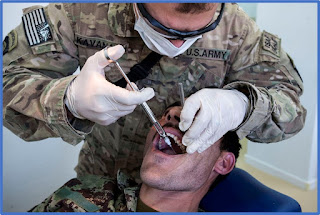When I was a kid, my dentist seemed scary and
rough. He was always pulling teeth. I inherited my small jaw from my British
father, and sturdy teeth from my Slavic mother.
The British were often lampooned as having the worst teeth, crooked and
looking more like a picket fence than a denture. My teeth were so crooked I couldn’t bite into
an apple! It hurt!
So teeth got pulled and braces were attached, and even
with all that, my teeth are still a little crooked but at least I can bite an
apple now without even thinking about it.
No more picket fence! It was
painful and scary, but I was always glad when the dentist would say, “you’re
done, time to rinse and spit”.
Prophets were not that much different in some ways
from dentists. They, looked at the
culture of the time and took some soul x rays.
Then they would say where the cavities were, where the plaque had built
up, where there needed to be more flossing, and where the cavities were.
Malachi called things as he saw them, and what he saw
was rampant corruption of the religious leaders. They were cutting corners, making excuses,
and putting their own interests first.
Malachi said they offered inadequate sacrifices and weren’t providing
the best spiritual experience they could.
The priests were probably coping to the best of their abilities. They were rebuilding the temple after it had
been destroyed by the Babylonians and were working with the returning refugees
as well as the people who stayed after the war. Two groups of people suffering
from generational post-traumatic stress. The priests tried to shape them into a
coherent team that could work together in a land where things were rough and
bumpy, where things were rutted and crooked.
Every shovel of dirt to clear and rebuild a farm, a road, a home, a
shop, had to be done by hand. It was a
time where the worry of another invading army would have been uppermost in
their minds. Where peace was a luxury
only to be dreamed of but never attained.
But the priests had gotten a little complacent, a little lackadaisical,
a little sloppy. Malachi called them to
repent.
John took his call to repentance a step further. He didn’t target the priests specifically, he
called everyone. His message wasn’t to
the elite but to everyone. Now John is a
puzzling character. When I picture him
in a modern-day context, I imagine him in tatters and rags, a street person
standing on a soapbox. The surprising
thing is that people actually listened to John, despite his odd eating habits
and bad wardrobe. They could see that he
had lived through tough times and respected him because of it. He must have been a tough son of a
gun. But why is he in our Advent
readings? Aren’t we supposed to be
reading about angels and babies and peace and hope? This passage sounds more like John is coming
as a threat not a blessing.
Did you know that John the Baptist is mentioned in
every gospel except John? He is
mentioned more than the shepherd which are only in Luke, more than Mary and Joseph,
who are not in Mark, and more than the wise men who are only in Matthew. Yet we don’t have a lovely statue of toddler
John the Baptist at the manger! John is
missing from the picture of Christmas.
But we ponder his words and actions every Advent as we ponder his call
to us to make things straight.
Advent is a time to do our yearly checkup and have our
spiritual teeth cleaned. Are our
dentures fitting properly, do we need to floss more, why is that tooth
hurting? It’s not easy going to a Godly
dentist, but just like going to an earthly one, we head off way more problems
when we go regularly. That’s what our
time of self-reflection and confession is, an opportunity to reflect on our
souls and scrub them before God. Get
that ungodly plaque off before we start getting cavities of our thinking and
feeling. Some people make a habit of
doing this daily, through meditation or bedtime thoughts. I journal every morning. Some of you get a daily devotional e-mail.
What do you do to keep your spirit clean and sparkly?
If Malachi is the dentist that cleans and scrapes our
teeth, maybe John the Baptist does the root canals and the cavity filling. And Jesus is the one who does the bridgework
and builds the braces.
Taking my crooked teeth and making them straight was
not easy, it was not cheap, it was not fast, it was not painless. And it was not something I could do
myself. I needed a dentist and also an
orthodontist. I needed my parents to
drive me to appointments. I needed the
Alberta Teacher’s Union who instituted dental plans. I needed a good anesthetist to put me under
so my impacted wisdom teeth could be extracted.
And I needed time. I could help
by brushing and flossing regularly, avoiding gum and popcorn, and getting
regular checkups.



No comments:
Post a Comment